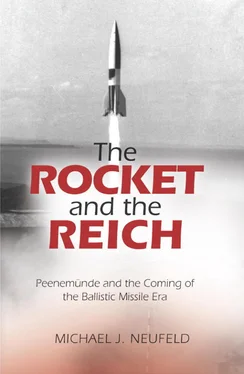Michael Neufeld - The Rocket and the Reich
Здесь есть возможность читать онлайн «Michael Neufeld - The Rocket and the Reich» весь текст электронной книги совершенно бесплатно (целиком полную версию без сокращений). В некоторых случаях можно слушать аудио, скачать через торрент в формате fb2 и присутствует краткое содержание. Город: Washington, Год выпуска: 2013, ISBN: 2013, Издательство: Smithsonian Books, Жанр: История, military_weapon, на английском языке. Описание произведения, (предисловие) а так же отзывы посетителей доступны на портале библиотеки ЛибКат.
- Название:The Rocket and the Reich
- Автор:
- Издательство:Smithsonian Books
- Жанр:
- Год:2013
- Город:Washington
- ISBN:978-1-58834-466-3
- Рейтинг книги:3 / 5. Голосов: 1
-
Избранное:Добавить в избранное
- Отзывы:
-
Ваша оценка:
- 60
- 1
- 2
- 3
- 4
- 5
The Rocket and the Reich: краткое содержание, описание и аннотация
Предлагаем к чтению аннотацию, описание, краткое содержание или предисловие (зависит от того, что написал сам автор книги «The Rocket and the Reich»). Если вы не нашли необходимую информацию о книге — напишите в комментариях, мы постараемся отыскать её.
The Rocket and the Reich — читать онлайн бесплатно полную книгу (весь текст) целиком
Ниже представлен текст книги, разбитый по страницам. Система сохранения места последней прочитанной страницы, позволяет с удобством читать онлайн бесплатно книгу «The Rocket and the Reich», без необходимости каждый раз заново искать на чём Вы остановились. Поставьте закладку, и сможете в любой момент перейти на страницу, на которой закончили чтение.
Интервал:
Закладка:
The departure of Peenemünde’s most powerful advocate was obviously a worrisome portent for the leaders of the rocket program, but there were more immediate threats. Notwithstanding a top priority rating and the August Führer order, in early December the Pilot Production Plant was forced to accept large cuts in its steel and gasoline quotas because of severe shortages of those commodities. In early January the center also lost its status as a “special enterprise” for a few weeks, until notices began to pile up from contractors that they could not hold to their schedules. Moreover, unlike the more open-minded Dornberger, Schubert was appalled by Todt’s new plans for the rationalization of the war economy, since they seemed to undermine further his original vision of the factory. 19
The Armaments Minister was in fact the big winner in the latest crisis. Despite his unwelcome warnings to Hitler that the eastern war was a national calamity, the Führer saw no way ahead other than Todt’s plans for rationalization. The only alternative would have been to give in to Göring’s campaign for a dictatorial role over all armaments production, but the Reich Marshal’s star was already on the wane for the failures of both the Luftwaffe and the Four-Year Plan. In a series of decrees from December to early February, Hitler extended and strengthened the Armament Ministry’s system of committees, which were organized on the principle of the “self-responsibility of industry”—that is, industrial enterprises were to coordinate and reorganize production among themselves with reduced intervention from the bureaucracy. 20
Suddenly, at the height of his influence, Todt was killed. On the morning of February 8, 1942, following a tumultuous meeting with Hitler over new decrees for the economy, the Minister’s plane blew up in the air after taking off from the airfield near the Wolfsschanze. Rumors immediately circulated that Hitler had eliminated him, but there appears to be no reason why the Führer would reorganize the economy in Todt’s favor and then get rid of him. It is possible that Göring or the SS was behind it, but in all likelihood the plane’s self-destruct mechanism was accidentally triggered after takeoff, because the pilot was making a desperate attempt to return to the runway at the time of the explosion. 21
By midday the Führer had already settled on a surprising choice as Todt’s replacement: Albert Speer, age thirty-six. The architect had coincidentally been passing through headquarters and had planned to be on the same plane as Todt but had delayed his departure because Hitler had kept him up until three in the morning. As a result, Speer’s appointment has often been described as fortuitous—a case of being in the right place at the right time—but he really was the logical candidate to carry forward Todt’s work. To have given Göring the post would have been to reopen many of the battles so recently fought; Speer had in any case accumulated much relevant experience in armaments construction. As it turned out, he also had a more ruthless drive for power than Todt: Within a year he had absorbed most of Thomas’s OKW Economics Office, driven the general into retirement, and secured the acquiescence of the Army and Navy to his system. Only the aircraft industry was kept beyond his reach, but Speer coordinated his activities with Field Marshal Erhard Milch, Göring’s number-two man in the Air Ministry. In short order, the productivity of German industry began to increase dramatically. 22
For the rocket program, Speer’s appointment was another stroke of luck; in fact, it more than compensated for the forced retirement of von Brauchitsch. The ambitious Minister was, by his own later admission, an uncritical enthusiast of the program, at least until the end of the war, when he all too suddenly realized its lack of military sense. Speer also possessed immediate access to Hitler and was determined to make the war economy more responsive to the Führer’s wishes. 23
Regarding Peenemünde, the Führer’s wishes in the spring of 1942 still seemed to be favorable, despite his lack of interest in the priority problems that beset the production facility. On March 5 or 6, Hitler asked Speer to investigate the raw materials requirements of producing 3,000 A-4s per month , although Speer’s record of this meeting may reflect his own advocacy of the project. Two weeks later the Führer did, however, reject the Luftwaffe’s transparently political request that it be allowed to do a “theoretical investigation” of the value of the A-4. Although Hitler’s enthusiasm for the rocket seems to have waned in the spring and summer of 1942, claims that he was hostile to the project (Army adjutant Gerhard Engel), or at least “exceedingly skeptical” (Speer), must themselves be regarded with skepticism. Those stories reflect Speer’s disappointment at the Führer’s unwillingness to commit to mass production before the missile had proved itself. 24
Thus, while the August Führer order may not have been the final breakthrough that the Peenemünders had thought it was, the rocket program had seen many of its manpower and material difficulties lessen after mid-1941. Even more than in the first phase of the priority battle, it is therefore difficult to find much evidence that Hitler significantly delayed the A-4’s development. It was the Production Plant that absorbed the bulk of the priority setbacks in the winter of 1941–42. But those delays would ultimately prove irrelevant, because technological problems had began to mount that would push the operational readiness of the missile back by as much as two years. That winter also saw increased competition from the Luftwaffe, which complicated the lives of the program’s leaders and made them feel that they were struggling against endless political obstacles, even when the competition had little effect on the A-4 schedule. Ironically, the new interservice struggles came on the heels of renewed attempts at cooperation that only demonstrated how contradictory was the Army-Luftwaffe relationship in rocketry.
FLYING BOMBS, ROCKET PLANES, AND ANTI-AIRCRAFT MISSILES
The air force’s March 1942 attempt to secure permission to do a “theoretical investigation” of the A-4 was only one sign of its growing insecurity regarding the Army rocket program. The Luftwaffe’s loss of prestige and its failure as a strategic bombing force over Britain were bad enough without the senior service presenting its ballistic missile as “relief” for the bomber, a claim Dornberger repeated in late March to General Thomas. In the same letter, the chief of Wa Prüf 11 made an argument for effectiveness of the A-4 as a terror weapon that was even more blunt than his assertions of mid-1941. A months-long, day-and-night missile campaign against British cities, he contended, would, “by creating panic and disorganization, make an important contribution to ending the war.” Furthermore, the unit cost of the missile would be cheaper than the cost of a bomber and its well-trained crew, which would be lost in just a few missions. That sort of argument did not sit well with Luftwaffe officers, who began to grumble that “the Army is beginning to fly.” 25
The first manifestation of the air service’s new opposition to the program had come somewhat earlier, in December 1941, when the Air Ministry obstructed Ordnance’s request to dismantle and move Zeppelin’s largest airship hangar in Friedrichshafen. The Ministry had wanted to blow it up, because it blocked a planned runway extension at Dornier Aircraft, another company in the Zeppelin group. Suddenly, the Ministry found that it needed the hangar when the Army requested it for use as an A-4 assembly plant. After three months of wrangling, Erhard Milch finally decided in favor of Ordnance, if it would bear all costs and provide the labor for the move. Notwithstanding this decision, Milch then went on to do more than anyone else to sustain competition with the Army by backing the creation of the “flying bomb” project, later dubbed “Vengeance Weapon 1” or V-1 by the Propaganda Ministry. That cheap alternative to the A-4 (V-2) was, according to Speer, “more than anything else a prestige object” for his friend Milch. In other words, it was a way to get back at the Army. 26
Читать дальшеИнтервал:
Закладка:
Похожие книги на «The Rocket and the Reich»
Представляем Вашему вниманию похожие книги на «The Rocket and the Reich» списком для выбора. Мы отобрали схожую по названию и смыслу литературу в надежде предоставить читателям больше вариантов отыскать новые, интересные, ещё непрочитанные произведения.
Обсуждение, отзывы о книге «The Rocket and the Reich» и просто собственные мнения читателей. Оставьте ваши комментарии, напишите, что Вы думаете о произведении, его смысле или главных героях. Укажите что конкретно понравилось, а что нет, и почему Вы так считаете.












